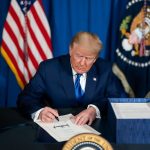President-elect Donald Trump’s inauguration is shaping up to be quite the event, especially given his bold move to slap tariffs on Canada, Mexico, and China—making it clear that he’s not about to dance around America’s border issues or the fentanyl crisis. This decision, announced on his very first day in office, has sparked a whirlwind of chatter, particularly among leaders in Canada and Mexico who seem to be scrambling for answers.
One can only imagine the panic in Prime Minister Justin Trudeau’s office as the news broke about the 25% tariffs on Canadian goods. Although he might have described the call he had with Trump as “good,” it’s hard to believe he wasn’t dreading it. With his trademark charm, Trudeau acknowledged the “intense and effective connections” between the U.S. and Canada. Apparently, those connections are about to get a lot more intense as tariffs loom overhead like a raincloud filled with thunder—and he’s hardly the only one sweating.
— Donald J. Trump Posts From His Truth Social (@TrumpDailyPosts) November 26, 2024
Down in Mexico, President Claudia Sheinbaum is also feeling the heat. Instead of shrugging it off, she rushed to reach out to Trump, complaining that the import duties threaten “common businesses.” In a remarkable turn of events, it seems that both Canada and Mexico believe that preventing drug trafficking and illegal immigration isn’t just an American concern, but an “our problem.” Who would’ve thought that tariffs could spark such introspection?
Despite the proposed tariffs tossing a wrench into the trade gears, there remains a faint flicker of hope in Sheinbaum’s statements. She has graciously offered to work together to create “a new labor mobility model”—what a lovely euphemism for job creation. While she professes the importance of trade partnership to remain competitive against economic giants, it’s hard for the average American to see how that stacks up against controlling the borders and ensuring safety from drug-related issues.
The glaring reality is that America’s internal struggles, especially related to the spiraling opioid crisis, cannot be solved by diplomatic niceties or empty talk of cooperation. As Trump has famously dubbed the North American Free Trade Agreement as one of the worst trade deals, the new United States-Mexico-Canada Agreement (USMCA) underlines his commitment to protect American interests above all. The buzz around this new wave of tariffs shows a decisive pivot back to prioritizing American jobs and safety over vague promises of future cooperation from reluctant neighbors.
Meanwhile, the left is up in arms, suggesting retaliation from Mexico and Canada. But one must wonder how that would actually play out. After all, with America standing firm and the polls indicating that 52% of Americans support those tariffs, even the toughest rhetoric might not be enough to deter a president willing to act decisively. Whether it leads to a tariff war remains to be seen, but one thing is already clear: Trump’s tenure is off to a fiery start, igniting conversations about borders, drugs, and, most importantly, what it truly means to put America First.




